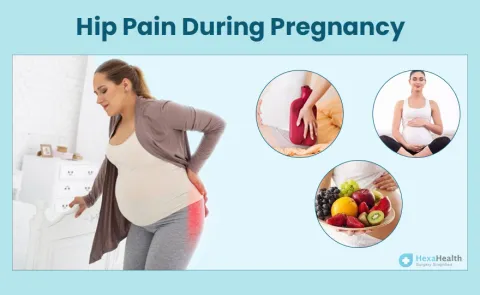Complications of Pregnancy

Table of Contents
Each pregnancy carries its risks which can vary from mild to severe. Some illnesses are normal, like nausea headaches, while others can be alarming and need immediate care. Good prenatal care, adequate rest, a proper diet, and support can help control, minimise, and solve complications. Many factors increase the complications during the pregnancy. Some complications may arise due to women's existing health problems, while new complications may arise due to hormonal and body changes during pregnancy. It is necessary to discuss with your doctor if you have any concerns so early diagnosis and measures can be taken for prevention.
Complication of Pregnancy
The various factors that increase the risk of complications during the pregnancy are:
- Smoking
- Structural abnormalities of the uterus and cervix
- Women getting pregnant under age 20 and above the age of 35 years
- Underlying conditions such as diabetes, hypertension, or cardiovascular diseases
- Chromosomal defects
- Overweight and underweight
- Sexually transmitted diseases (STDs are transferred to developing babies leading to complications)
- Polycystic ovary syndrome
- Uterine fibroids
- Multiple pregnancies
- Autoimmune diseases, kidney and thyroid diseases
- Complications of pregnancy
- Some of the complications of pregnancy are:
1)Hypertension
What is it? High blood pressure is called hypertension. It occurs when arteries carrying blood get narrowed.
Who is at risk? Women above the age of 35 years, have first pregnancy, are obese, have underlying conditions such as kidney disease, have hypertension in a previous pregnancy and have twin pregnancies are at high risk.
Symptoms: Hypertension results in increased pressure in arteries. It can make it hard to supply blood to the placenta in pregnancy. As a result, it reduces the supply of nutrients and oxygen to the fetus. This slows down the growth of the fetus and places the mother at greater risk of preterm labour and preeclampsia. The high blood pressure that develops during the pregnancy is called gestational hypertension. It goes away after the delivery.
2)Gestational diabetes:
What is it? It is a type of diabetes that develops during pregnancy.
Who is at risk? Women who are obese or overweight, have the polycystic ovarian syndrome, have a family history of diabetes, and history of gestation diabetes are at high risk for developing gestational diabetes.
Symptoms: Gestational diabetes prevents the body from breaking down the sugar and results in extreme thirst, hunger, or fatigue. It can be controlled following a healthy meal plan and medications. Insulin may be needed in some cases to keep the blood sugar in control. Poorly controlled diabetes increases the risk of preeclampsia, early delivery, cesarean birth, or the baby growing much more significantly than average (macrosomia).
3)Miscarriage:
What is it? The loss of a pregnancy within the first 20 weeks without any medical interference is called a miscarriage.
Who is at risk? There are several reasons for miscarriages, such as chromosomal abnormalities or problems with the reproductive system. Women with infection, uterine abnormalities, advanced maternal age, abnormal implantation of the fertilised egg, and congenital heart disease are at increased risk for miscarriage.
Symptoms: The most common signs of miscarriage are abnormal vaginal bleeding, lower abdominal pain, cramping, and the disappearance of pregnancy symptoms
4)Ectopic pregnancy:
What is it? When the fertilised egg gets implanted outside the uterus (in the fallopian tube) is called Ectopic pregnancy. With an ectopic pregnancy, the egg cannot develop because of the space limitations and lack of nutrients tissue.
Who is at risk? Women who smoke, have an infection or tubal surgery, have undergone fertility treatments and have a history of ectopic pregnancy are at increased risk of ectopic pregnancy.
Symptoms: It causes severe abdominal pain, shoulder pain, vaginal bleeding, or damage to a woman's reproductive system. If the fetus continues to grow, it results in the fallopian tube bursting, leading to severe bleeding. The medicines or surgery are performed to remove the ectopic tissue.
5)Hyperemesis gravidarum:
What is it? It causes severe persistent nausea and vomiting during the pregnancy that does not go away.
Who is at risk? Women with medical history or family history of the condition, who have migraine or are pregnant with two or more fetuses are at increased risk for hyperemesis gravidarum.
Symptoms: It leads to vomiting several times a day, dehydration, weight loss, and reduced appetite. Dry, bland foods and fluids are used as the first line of treatment, and sometimes medications are prescribed to help with nausea. In severe cases, hospitalisation may be needed so they can be fed nutrients and fluids intravenously.
6)Amniotic fluid complications:
What is it? Amniotic fluid is the fluid around the womb and fetus. It keeps the fetus safe from trauma and helps in maintaining the temperature inside the womb. The presence of too much or too less amniotic fluid interferes with the normal functions of the womb.
Who is at risk? Maternal diabetes, fetal anaemia, infections during pregnancy, and birth defects affecting the central nervous system and gastrointestinal system are the risk factors for amniotic fluid complications.
Symptoms: Low amniotic fluid can prevent a baby from developing lungs and limbs and affects the digestive system. In contrast, excess fluid can cause premature rupture of the amniotic membrane, preterm labour, postpartum haemorrhage, or placental abruption. The doctor may pump the saline solution into the amniotic sac in case of low amniotic fluid. Excessive amniotic conditions are treated through medications.
7)Preterm labour
What is it? In preterm labour, labour initiates after 20 weeks and before 37 weeks of pregnancy.
Who is at risk? Many risk facts can lead to preterm labour, such as smoking, uterine fibroids, history of multiple abortions, inadequate prenatal care, or incompetent cervix. Medications and bed rest are advised to stop contractions.
Symptoms: Symptoms of preterm labour include mild abdominal cramps, lower abdominal or pelvic pressure, persistent backache, and light bleeding or vaginal spotting.
8)Stillbirth:
What is it? Stillbirth is a condition in which the fetus dies in the womb anytime after 20 weeks of gestation period.
Who is at risk? Women who smoke, attain pregnancy at an advanced stage, drink alcohol, are malnourished, are obese, suffer from an underlying medical condition and have a history of stillbirth are at increased risk.
Symptoms: Women who had stillbirth may experience no fetal movement and spotting or bleeding. The death of the fetus is confirmed by ultrasound.
9)Iron deficiency Anaemia:
What is it? Anaemia is the condition of a low level of red blood cells. Gestational anaemia may be due to the increased requirement for iron in women during pregnancy.
Who is at risk? Women with multiple foetuses, less gap between two pregnancies, history of anemia, non-supplementation of iron-rich food during pregnancy, and severe pre-pregnancy menstrual bleeding are at increased risk.
Symptoms: Women with this condition experience fatigue, weakness, headache, shortness of breath, pale skin, and dizziness.
10)Depression and anxiety:
What is it? Almost 7% of women experience depression during pregnancy. It involves persistent sadness and lack of interest.
Who is at risk? Unplanned or unwanted pregnancy, history of mental illness, domestic violence, lack of partner support and social support, pregnancy complications, and adverse life events are risk factors for depression during pregnancy.
Symptoms: Symptoms of depression during pregnancy include initiating smoking or drinking, inadequate weight gain, low self-esteem, loss of interest in activities, and suicidal ideation.
How HexaHealth helps you in your journey toward Pregnancy
We at Hexahealth know-how Pregnancy is an important, special journey for any woman. We have top Doctors in our network and panel, who provide top-notch treatment to any of your pregnancy-related problems and careful examination of you and your baby. Please feel free to contact our #Hexahealth#
Updated on : 2 May 2022
Reviewer

A specialist in Obstetrics and Gynaecology with a rich experience of over 21 years is currently working in HealthFort Clinic. She has expertise in Hymenoplasty, Vaginoplasty, Vaginal Tightening, Labiaplasty, MTP (Medical Termination...View More
Author

She is an accomplished new-age professional who has interviewed prominent personalities such as Bhaichung Bhutia, G. Sathiyan, Shashi Tharoor, etc. A content writer interested in health communication, graphic desi...View More
Related Expert Doctors
Related Hospitals
Latest Health Articles



























